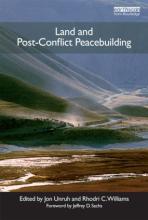/ library resources
Showing items 1 through 9 of 18.Claims to land and territory are often a cause of conflict, and land issues present some of the most contentious problems for post-conflict peacebuilding.
When the guns are silenced, those who have survived armed conflict need food, water, shelter, the means to earn a living, and the promise of safety and a return to civil order.
This edited volume brings together the work of scholars from different disciplines including sociology, political science and anthropology, and analyses how global institutions are embedded in local contexts within development aid.
Payments for Ecosystem Services (PES) and Reduced Emissions from Deforestation and Forest Degradation (REDD) are considered effective market-based conservation approaches.
By the end of the 1980s, Argentina was in the middle of a severe economic crisis. In 1991, the Deregulation Decree, which steered the political economy toward a new neoliberal policy, dismantled the Argentine National Forestry Institute (IFONA), an autonomous bureaucracy responsible for forests.
Although efforts in improving forest rights across developing countries are growing, de jure property rights and physical ownership of forests do not automatically enable farmers to obtain benefits from forests.
The values of conservationists and planners will affect their decisions, tools, and practice, while the values of the public will affect the social acceptability of different management actions and, consequently, the likely success of implementation.
Paginación
Land Library Search
Through our robust search engine, you can search for any item of the over 73,000 highly curated resources in the Land Library.
If you would like to find an overview of what is possible, feel free to peruse the Search Guide.






